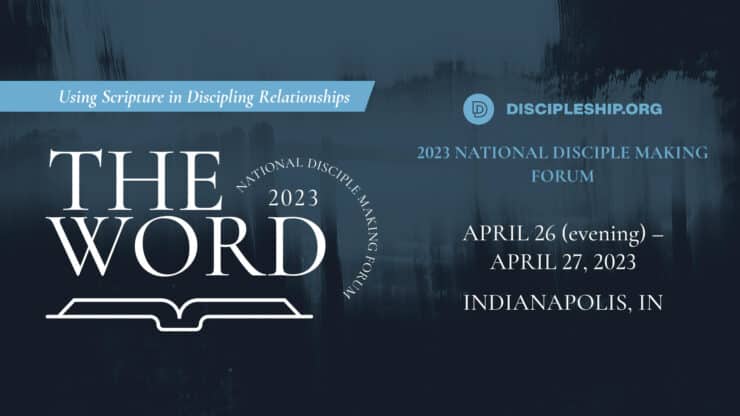Making Disciples: 10 Future Trends to Embrace

At Discipleship.org, we champion Jesus-style disciple making. We are a community of over 30,000 who see ourselves as disciples of Jesus who make disciples with Jesus. To that end we aggregate and promote disciple-making leaders, organizations, speakers, and writers. On our website we host all kinds of conversations, trainings, eBooks, podcasts, and blogs.
Most significantly, we are hosting a national disciple making forum at the end of April in Indianapolis.
We regularly publish our top 10 trend list to share with other leaders what we are seeing in terms of disciple-making trends. From our front-row seat we witness what is happening with disciple making in North America and beyond. We then pool insights from all the leaders, practitioners, and organizations we can find and compile the top disciple-making trends of what we see God doing in North America. We hope you find the list to be helpful.
We hope this list will inspire you to jump in and embrace these trends – the future of your church and ministry may depend on your choices.
- Focus on Fasting and Prayer – Don’t Rely on Leadership and Strategy
I am for leadership and strategy, but they are not primary. I am convinced that we have great power amid the challenges that we face. In the words of Romans 8:31, “…If God is for us, who can be against us?” We face huge challenges to the faith and the strength of God’s church in North American today. But we have come from a long line of disciples of Jesus going back through twenty centuries who have faced greater challenges than what we face. They endured.
They were strong because they relied on God.
They found power through personal reliance on the Holy Spirit through prayer and fasting. There has never been a better time to become experienced in the spiritual practices of prayer and fasting. If you look at effective disciple making today, you will find that it relies on fasting and prayer. Jesus made us a promise in Luke 11: 9-10, “So I say to you: Ask and it will be given to you; seek and you will find; knock and the door will be opened to you. For everyone who asks receives; the one who seeks finds; and to the one who knocks, the door will be opened.”
It’s time to reclaim this focus.
Let me state this point positively. We have observed that fasting and prayer is a key component behind international disciple making movements. When people ask why we are not seeing these disciple making movements in North America, we point to our belief that a lack of fasting and prayer may be one of the key reasons.
We are not saying that fasting and prayer is like magic–human actions that make God give us what we ask for. God may have reasons that God alone knows why he will or he will not grant our requests. But, at the same time, he teaches us to pray and that we do not have things because we do not ask God. (James 4:2) Fasting and prayer are key tools in our earnest efforts as we look to God to unleash his power. God’s Word teaches us to “Come near to God and he will come near to you…” (James 4:8)
Church historians tell us that prayer is a precursor to revival and the great movements of God’s Spirit.
- Insist that All Your Leaders Model Intentional, Relational Disciple Making – Show Your Members the Way
Ralph Waldo Emerson once said, “What you do thunders above your head so loudly, I cannot hear the words you speak.” Our authenticity becomes the daily testing ground that authenticates the teaching and leading we do in the church.
You Must Be a Personal Disciple Maker – or people in your ministry and in your church will not embrace disciple making.
You must be what you want others to be. We describe it in this way:
- You can’t lead where you don’t go
- You can’t teach what you don’t know
- You can’t give what you can’t show (by your lifestyle)
There are a surprising number of church leaders who do not regularly, personally, and relationally disciple others, especially their key leaders.
They say they are too busy…
If they are too busy to personally make disciples, then they have a messed-up paradigm of what it means to lead a church. Every church leader needs to keep looking at their church and Jesus’ model. He made disciple making his top ministry focus–the twelve men he left to carry on his mission were the essential fruit of his efforts.
The church will never make disciples and raise up disciple makers if the Senior Minister/Pastor or the ministry leader or other key leaders do not set the example and model it.
When you live out the lifestyle of making disciples, you will naturally speak and tell stories about your disciple-making efforts and everyone in the church will know that the leaders are practicing what they want the church to practice.
Your leadership in making disciples will be what comes through when you speak, teach, and share.
Nothing is more important in your leadership than your example.
- Craft a Church-Wide Disciple Making System
Disciple making is God’s plan “A” for the church.[1] Because of that plan, the task of leaders is to create a system in which everyone is discipled. Leaders do not disciple everyone, but they make sure everyone is discipled. In other words, the leaders and their team are called to lead in the development of a church-wide system that will make disciples – and disciples who make disciples.
The Senior Minister/Pastor’s central role in creating the system cannot be delegated to others–including executive ministers/pastors and discipleship ministers/pastors.
Leadership is a responsibility that is broader than just discipling others or leading a small group. We Senior Ministers/Pastors follow Timothy and Titus and build churches that serve as the “household of God” and the “pillar and buttress of the truth.” (1 Timothy 3:14-16 ESV)
Included in Paul’s instructions to Timothy was the call to develop disciple-making leaders and systems. Paul writes about this in 2 Timothy 2:2, “The things you have heard me say in the presence of many witnesses entrust to reliable people who will also be qualified to teach others.”
As the senior church leader, your job is to create the community-wide system in which you set the example and also create a system so that everyone can be involved in intentional, relational discipleship environments.
You are the primary architect of a disciple-making community.
God will help you with team members, but the buck stops with you. Yes, you should build with teams of leaders who work together to fill in the gaps. We work together and are responsible for developing the program in which the team is trained, inspired, encouraged, challenged, and fully developed.
- Adopt a Simple, Effective, and Reproducible Model
Those three words describe the personal disciple making model every person and every church needs.
Several years ago, we brought on a staff minister from another church to join the staff at the church where I serve as lead pastor. It was the early days of our focus in shifting to a disciple making culture. Our staff worked hard together to adapt to the differences between the Nashville area (where we are located) in comparison to the North Idaho area (where our new staff minister came from). He loved basketball. So, one day he compared the disciple-making system that we were developing to the way the Harvard University basketball team played basketball.
“It is pretty complicated,” he said. “But it might work.”
I soon realized the problem. Effective disciple making must focus on every-day disciples, not experts. We didn’t need a Harvard system.
If it is too complicated for the average, everyday person to adopt, then it will not be easily reproducible and it will not multiply. This is a big learning from disciple making churches and disciple making movements:
- To be repeatable –the disciple making model must be simple.
You want a discipling model that everyone can use–from truck drivers to stay-at-home parents, to doctors and lawyers.
So, when you are working on a team and you are seeking to create a disciple-making system, remember these three words:
Simple – it must be simple to understand, participate in and lead others to do. It can be a missional community, small group, micro-group or even a one-on-one system. Just make sure it is simple, make it easy.
Effective – some of the best personal disciple-making models I have tried sound great in theory, but they were ineffective in practice. Some models work with certain groups but not with other groups. Some models work well in one part of the country, but not in another. I jokingly tell my co-workers that over 90% of the ideas that I have tried do not work.
We have learned to underrate the wooden adoption of disciple-making models. Let me share a good example.
Lots of people around North America have been trying to utilize Discovery Bible Study, but we are not currently seeing the effectiveness with this method in North America that others are seeing around the world. Is it because we do not have a culture where obedience is natural? Is it because we do not want to be accountable to share our faith with lost people? Is it because we are not providing the foundation of fasting and prayer? These are good questions that our team is investigating. The key point is that we want to make sure that we adopt effective models before we get the whole church to follow us. We each need our own effective model.
Reproducible – we want to raise up disciples who make disciples. That means that we also want our personal disciple-making model to be easy for people who have been discipled by us to repeat the same process with others. Sometimes people describe what we are talking about here as portable–people can take our model of disciple making and use it with men or women, students or adults, blue-collar or white-collar.
In short, when we utilize a personal disciple making model, we want one for everyday people. We want a personal model for our ministry and/or church that creates disciples who make disciples, who make disciples, who make even more disciples…
- Join Those Looking to Disciple Making Movements for Innovation
Read the following definition of a disciple making movement. Over 1% of the world’s population have joined these groups in the last 25 years.
A Disciple Making Movement (DMM) – A rapid and exponential increase in disciple making disciples (1,000 or more) within a local culture whose churches plant multiple churches and these churches are churches who multiply disciples, groups, and churches of obedience-based disciples so that we can see at least four generations of churches produced in six streams of disciple-making activity and these streams multiply consistently into churches (100 churches or more within 2 to 5 years).
Notice the diagram of the five levels of church when it comes to how disciples are subtracted (-) or added (+) or multiplied (x). In our national study released in early 2020 we could only find less than 5% of churches that were reproducing disciple making. That means that over 95% of churches are focus on programs as the means of discipling people (or losing disciples). We could not find any level 5 (multiplying) churches in North America.

Level 1: Subtracting // Level 2: Plateauing // Level 3: Adding
Level 4: Reproducing // Level 5: Multiplying
Now read our definition of a disciple making church from a disciple making movement.
A Disciple Making Church (Level 5) – is a church where disciple making is the core DNA and culture of the church, where the average church member makes disciples to the fourth generation and this disciple making activity is regularly produced in significant and diverse streams within the church and these streams multiply consistently into new churches.
There are over 1,500 of these disciple making movements around the world and we North Americans need to learn from them. Here are 10 of their characteristics.
- Jesus-style disciple making is the core mission of the church–it is motivated by love for people lost without salvation in Jesus–and the church regularly multiplies disciples and disciple makers.
- Disciple making is the cultural identity of the church–reflected in the multiplication of the church’s values, actions, and words.
- Every decision made and every dollar spent passes through this filter: “how does this help us make disciples in relational environments like Jesus?”
- Praying and fasting is significantly entrenched–it happens a couple of times a week and it is intensified in special seasons –asking for God to empower disciple making.
- The core leadership team’s focus is not just on making disciples, but on making disciple makers (of lay leaders) with at least 40+% of core leadership time spent personally equipping and coaching leaders in the disciple-making process (outside of weekend gatherings).
- Almost everyone (90%+) has become mobilized to make disciples and plant churches. There is a joyful expectation that every disciple should “obey all of Jesus’ teachings” and make disciples.
- Everyone uses the same simple, effective, and reproducible disciple-making model (disciplined application of the same model).
- Disciple making in the church is viral–these disciples regularly multiply themselves at least four generations deep and in multiple streams that also multiply themselves consistently.
- Disciple making results in multiple church plants every year.
- Church leaders hear stories many times a week of formerly lost people who are now making disciples and planting churches.
Let me make a shameless plug for you to join the National Disciple Making Forum in April. We will feature three international leaders of disciple making movements – and you can learn from them:
- Shodankeh Johnson – Sierra Leone
- Curtis Seargent – an American with incalculable influence in Asia and world-wide influence
- Josh Howard – an American living in India helping lead a movement that planted 8,000 churches last year
- Make Scripture Your Curriculum – Evangelical Christians Do Not Know Scripture Like They Did in the Past
A big part of the reason why the cultural progressives are winning over more and more evangelical Christians to their beliefs and worldview is that fewer and fewer evangelical Christians are regularly reading their Bibles and actually learning the teachings of Scripture. For the last several decades, the typical evangelical church has dropped much of its programming that focused on Scripture (such as Sunday school and Wednesday night services) and they are relying just on Sunday morning sermons to get their people into the Bible. And the sermons are often dependent upon inspiration, personal stories, and practical applications–without a steady diet of biblical teaching. The sermons inspire people, but too often they do not teach people how to read and understand God’s Word. The net result is that people are spending less and less time in the Bible.
At the same time, individuals and families tend to be reading less and less Scripture at home.
Into this environment, the dominant voices of social media, universities, and entertainment are speaking progressive values. They are discipling the minds of more and more people into ideals built on other worldviews (such as the ideology of intersectional feminism, which you can see played out in many Diversity, Inclusion, and Equity trainings).
Although many of our Western ideals (e.g., the equal value of all people; all ethnicities being of the same family) arise from Christian influence, many newer secular and intersectional ideals do not fit in with the teaching of the Word of God, and many actually work to inflame tensions and divide people into tribalistic camps.
The church must point to a better way. We must provide a genuine countercultural alternative to what is happening in the world. We recommend a strategy to disciple everyone in Scripture and what it teaches. Here are six specific recommendations that come from my experiences as the lead pastor of my local church.
- Make sermons primarily expository, teaching through books of the Bible.
- Make Scripture the primary curriculum for discipling groups (not just books about Scripture). Get everyone to regularly apply Scripture to life.
- Develop supplemental discipleship groups (small, I’d recommend 3-5 people only) where Scripture engagement and memorization become the norm.
- Develop Scripture reading plans that encourage individuals and families to be in the Word daily (e.g., reading through the entire New Testament in 2023).
- Provide in-depth Bible study classes that require extra reading and Scripture memorization for those who are willing and able to join.
- Provide special 1.5 to 2-hour, in-depth seminars grounded in Scripture at least six times a year.
- Recommend podcasts (see #10 below)
We want to encourage everyone to personally learn the teachings of Jesus–and put them into practice.
- Shore Up Your Doctrinal Foundations – The Evangelical Consensus Has Eroded
For over 235 years, there was a basic Protestant-Evangelical consensus in America when it came to some basic worldview questions (mainline churches drifted from that conservative consensus). The Evangelical view coming out of the 1960s was promoted and shared by Southern Baptists, Presbyterian Church of America, Christian Churches, Assemblies of God, and the other churches. That consensus focused on six key items:
- The reliability and authority of Scripture
- The necessity of salvation through Jesus Christ
- The vital importance of evangelism of all people
- The vital role of the local church for Christian life
- The morality of the Bible, especially in sexuality and the 10 Commandments
- Serving others and helping those in need
That consensus is breaking down.
The first item is the most influential. A high view of Scripture leads us to embrace the other elements of evangelical Christianity: the necessity of salvation in Jesus Christ, an emphasis on evangelism, the vital role of the local church, etc.
That is why the focus is on Scripture during the 2023 National Disciple Making Forum.
The reliability and authority of Scripture is being undermined in more and more Evangelical churches by an incipient progressive Christianity.
This movement used to live primarily within mainline, liberal denominations. But it is now gaining a foothold in the evangelical church. Here is a concise definition of the heart of progressive Christianity: the willingness to compromise or reinterpret Scripture to fit in with the progressive ideals of our culture.
Progressives think they are building an on-ramp to Christianity for people immersed in the culture, but, in reality they are building an exit-ramp for Christians to embrace the views of the culture.
The alternative to Progressive Christianity is biblical discipleship and is characterized by the willingness to uphold the Lordship of Jesus as taught in Scripture – regardless of cultural pressures. This rootedness in Scripture’s authority shows why biblical discipleship involves standing against the impulse to force Scripture to fit cultural ideals.
One’s view of the reliability and authority of Scripture is key in navigating this cultural moment. Whereas progressive Christianity is more of a theological movement, there are political movements, both rightist and leftist, which would co-opt and conscript our historic faith to serve as lapdogs to give religious legitimacy to their platforms. Whether the temptation is coming from those on the right and or from those on the left, the kingship of Jesus through Scripture is our higher authority and demands our ultimate allegiance.
More can be said about this point, but the key for us is that we are called by Jesus to uphold the primacy and reliability of Scripture.
Read the following words by my friend David Young (about the future) and ask yourself about how important discipling people in the Word of God will need to be for disciples of Jesus to thrive?
Many Christians will have to learn to conduct themselves under the radar, avoiding social media statements and the like. Christians are already hiding many of their beliefs at work; it will only get worse. In many ways, I believe our affluence will work against us as the U.S. becomes more aggressively anti-Christian. We will want to play ball with secularism because we have so much to lose financially. And we will avoid building strong counter-cultural institutions because we won’t have to–-we have enough wealth to weather the storm for a long time without changing our routines very much. Expect cultural Marxism, a continued erosion of any sense of personal virtue and vice, and a shocking hypocrisy from those on the left.
Young is not pessimistic about the future because he knows the power of disciple making. He describes a future hope that he envisions.
But, there will be faithful Christians who shine, who make up strong Christian homes, and who survive through their unwillingness to say that which is obviously false. They will become more attractive to others committed to Jesus, while Christians on the left fall away in increasing numbers.
- Teach about God’s Holiness, Hell, and the Gospel – or Evangelism and Church Planting Will Soon Die
God, as revealed throughout scripture is a good, loving God, but he is also much more than most people understand. God is holy.[i] For God to be “holy” means God is “pure, free from every stain, wholly perfect and immaculate in every detail.” To say God is holy means no sin, wrongdoing, evil, or anything bad exists in him. 1 John 1:5 is clear, “…God is light; in him there is no darkness at all.”
God’s holiness explains why there is a veil between humans and God (that originated in the garden of Eden). It explains why human beings are separated from God and destined to die. Because God is holy, he must insist that all his creatures be like him, lest his own holiness, dignity, honor, and sovereign rule over the universe be diminished. This makes him very different than humans. He is high, dignified, lofty, and worthy of profound reverence.
Sin is not as much a single act of rebellion toward God and how he told us to live as it is an ongoing attitude of rebellion or seeking to be our own gods. It is where we tell God that we will live life on our terms, not his. As the Bible says in Isaiah 59:2, “Your iniquities have separated you from your God; your sins have hidden his face from you, so that he will not hear.” Romans 3:23 puts it succinctly, “…for all have sinned and fall short of the glory of God.”
- Humanity Is Now Separated from God by Nature and Is Part of Satan’s Kingdom
The first and most important consequence since the time of Adam and Eve is that, by nature, we are separated from God. God is holy; we are all sinners. Every person comes into the world and naturally gravitates to sin in thought, word, and deed. (Romans 5:12) We now come into this world as people who are “spiritually dead.”
As for you, you were dead in your transgressions and sins, in which you used to live when you followed the ways of this world and of the ruler of the kingdom of the air, the spirit who is now at work in those who are disobedient. All of us also lived among them at one time, gratifying the cravings of our flesh and following its desires and thoughts. Like the rest, we were by nature deserving of wrath. (Ephesians 2:1-3)
Let us state it again: we are all spiritually dead, separated from God by nature (Ephesians 2:1-3). We must start with this understanding, or we will not appreciate our need for reconciliation. As human beings, we all find ourselves in the same situation: following the ways of the world, living in a kingdom ruled by Satan, pulled by cravings we struggle to control, and separated from God.
- We Will All Be Subject to God’s Judgment at the End of Our Lives
The Bible teaches that Jesus Christ will come back to the earth and bring history to an end. Once he comes back, or if we die first, our eternal fate has been set. There will be no second chances. God will judge us and fix our eternal destiny. The book of Romans describes it this way:
For we will all stand before God’s judgment seat. It is written: “‘As surely as I live,’ says the Lord, ‘every knee will bow before me; every tongue will confess to God.'” So then, each of us will give an account of himself to God. (Romans 14:10b-12)
At this judgment, God will call us to account for everything we have done. We will even have to give an answer for every careless word we have spoken. (Matthew 12:36)
- God Will Punish Us for Our Sins if we Do Not Receive His Forgiveness
Our separation from God is the most serious problem we face. It is our core problem. We will be eternally cut off from God and punished for our sins. This is described in 2 Thessalonians 1:8-9:
He will punish those who do not know God and do not obey the gospel of our Lord Jesus. They will be punished with everlasting destruction and shut out from the presence of the Lord and from the glory of his might.
Jesus himself said, “Whoever rejects the Son will not see life, for God’s wrath remains on him.” (John 3:36)
- Jesus’ Gospel of Salvation is our Only Hope
God so loved the world that he sent his only son that whosoever believes in him will not perish but will have eternal life. (John 3:16) The path to forgiveness through Jesus Christ is essential. The alternative is unthinkable. But until we understand that we are lost in sin, we will not appreciate our need for salvation.
Christians will not feel compelled to disciple lost people, if they do not think they are lost. Church Leaders will not sacrifice to plant churches or send missionaries if they do not believe people are lost.
Ask yourself when did you last hear clear teaching on God’s holiness, the reality of hell and the kind of sacrifices needed to disciple lost people?
- Make Family Discipleship a Top Priority – There is a Crisis in Family Discipleship
The clearest exposition on disciple making is the one given by Moses to parents when the nation of Israel was established in the Sinai desert, as the people came out of Egypt. God’s plan was that parents would obsessively (yes, more on this word below) disciple their children and it would be the primary means by which the faith of Israel would be passed on from generation to generation.
The primary text is Deuteronomy 6:4-9. It is called the Shema and it had three key parts.
- Parents Acknowledge God’s Kingship/Sovereignty
Deuteronomy 6:4 – Hear, O Israel: The Lord our God, the Lord is one.
- Parents Personally Devote Themselves to God Daily with their Entire Beings
Deuteronomy 6:5-6 – Love the Lord your God with all your heart and with all your soul and with all your strength. These commandments that I give you today are to be on your hearts
- Parents Intentionally/Obsessively Teach God’s Commands to their Children
Deuteronomy 6:7-9 – Impress them on your children. Talk about them when you sit at home and when you walk along the road, when you lie down and when you get up. Tie them as symbols on your hands and bind them on your foreheads. Write them on the doorframes of your houses and on your gates.
I call Deuteronomy 6:4-9 the great commission before the great commission of Matthew 28:18-20. Truth be told, in history most conversions happened in the home. For example, most estimates are that in the last one hundred years about 80% of all people who came to Christ in North America did so before they were fourteen years of age.
There is no area of disciple making that is more important than family discipleship.
Let us state it this way: a church can get an A+ for discipling adults, but if it does not get parents to disciple their children, that church will get a failing grade.
10. Use Technology and Social Media to Disciple People – Use the Tools Your People Use Everyday
Some estimates tell us that young adults (and others) are engaged with social media up to seven hours per day. It reminds me of a Babylon Bee meme that states: “Parents Baffled That 1 Hour Of Youth Group A Week Not Effectively Combating Teen’s 30 Hours On TikTok.”
Here is the truth – the world is out-discipling the church because the world gets a lot more time in the minds of Christians–and on an intense and consistent basis.
Natasha Crain published a very helpful post entitled, “5 Ways Christians are Getting Swept into a Secular Worldview in This Cultural Moment.” As she points out, many people around us are jumping on a bandwagon of some kind, and the dominant bandwagon is not rooted in values consistent with a biblical worldview.
2 Corinthians 10:5 – We demolish arguments and every pretension that sets itself up against the knowledge of God, and we take captive every thought to make it obedient to Christ.
Romans 12:2 – Do not conform to the pattern of this world but be transformed by the renewing of your mind. Then you will be able to test and approve what God’s will is—his good, pleasing, and perfect will.
- Websites – such as org, thegospelcoalition.org, and others should be promoted by church leaders.
- Share your thoughts – you can creatively and positively show the way of Jesus, especially as the people in your church follow you on Instagram, Twitter, FaceBook, TikTok, etc.
- Blogs – find and share great blogs that answer common questions.
- YouTube – find and share YouTube channels and posts – it is the second most-used search engine, after Google, on the web. Millennial and Gen Z gravitate to good, short video teaching.
- Podcasts – create podcasts and recommend podcasts. Many of the people in our churches spend 5 to 20 hours traveling to work each week. Create or recommend good podcasts for them.
- Music – music has always been a big part of how we are discipled. Recommend and promote good Christian music.
[1] See Harrington and Sager, Disciple Making: The Core Mission of the Church (Renew, 2021).
[i] Richard Lovelace traces this theme out in more detail. See, The Dynamics of the Spiritual Life: An Evangelical Theology of Renewal, Expanded Edition (Downers Grove: IVP Academic, 2020).
If you have enjoyed reading this, please consider joining our email list!












